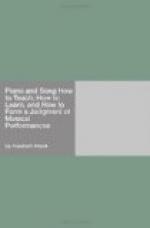But let us proceed with your instruction. You already play your piece intelligently, with interest and enthusiasm, and without any of the modern, empty affectations. If any other passage should occur to you at the fermata in the second part, which shall lead appropriately to the dominant, try it; and combine it, perhaps, with that which is written. You may make two passing shakes upon the four final sixteenth notes; but you must play them very distinctly and clearly, and the last one weaker than the first, in order to give it a delicate effect, as is done by singers. With light variations of this kind, it is allowable to introduce various ornaments, provided they are in good taste and nicely executed. The case is quite different in the performance of the compositions of Beethoven, Mozart, Weber, and others, where reverence for the composer requires a stricter interpretation, although even this is sometimes carried to a point of exaggeration and pedantry. Now try the first variation once more. That is better: you already play the skipping bass with more precision, more briskly and evenly. We begin to perceive the correct speaking tone in the bass, and a certain delicacy and freedom in the treble. You need not play both hands together in the second variation, which is the most difficult, until the next lesson. To-day you may first play the bass alone, while I play the treble; and afterwards we will change parts, and you can play the treble while I play the bass. But we will not go farther than the fourth variation. I have not much more to say about this piece. We will begin next a beautiful Etude by Moscheles, which I recommend highly to you, in order to strengthen and give facility to the fourth and fifth fingers: this may be your companion and friend during the next two or three months.
MRS. SOLID. Your very careful mode of instruction assures me that Emily will acquire a mastery of these variations, and will learn to perform them finely.
DOMINIE. She will be able, after a week or two, to execute this piece with understanding and confidence, and to play it to her own satisfaction and that of others; while her awakened consciousness of its beauties and of her ability to interpret it will preserve her interest for it.
The objection is quite untenable “that children lose their pleasure in a piece, if they are obliged to practise it until they know it.” Do people suppose that it gives more pleasure, when the teacher begins in a stupid, helpless way, and tries to make the pupil swallow several pieces at once, while he continually finds fault and worries them, than when the pupil is enabled to play a few short, well-sounding exercises, with perfect freedom and correctness, and to take delight in his success? or when afterwards, or perhaps at the same time, he is conscious that he can play one piece nicely and without bungling, while it is all accomplished in a quiet and pleasant manner?




